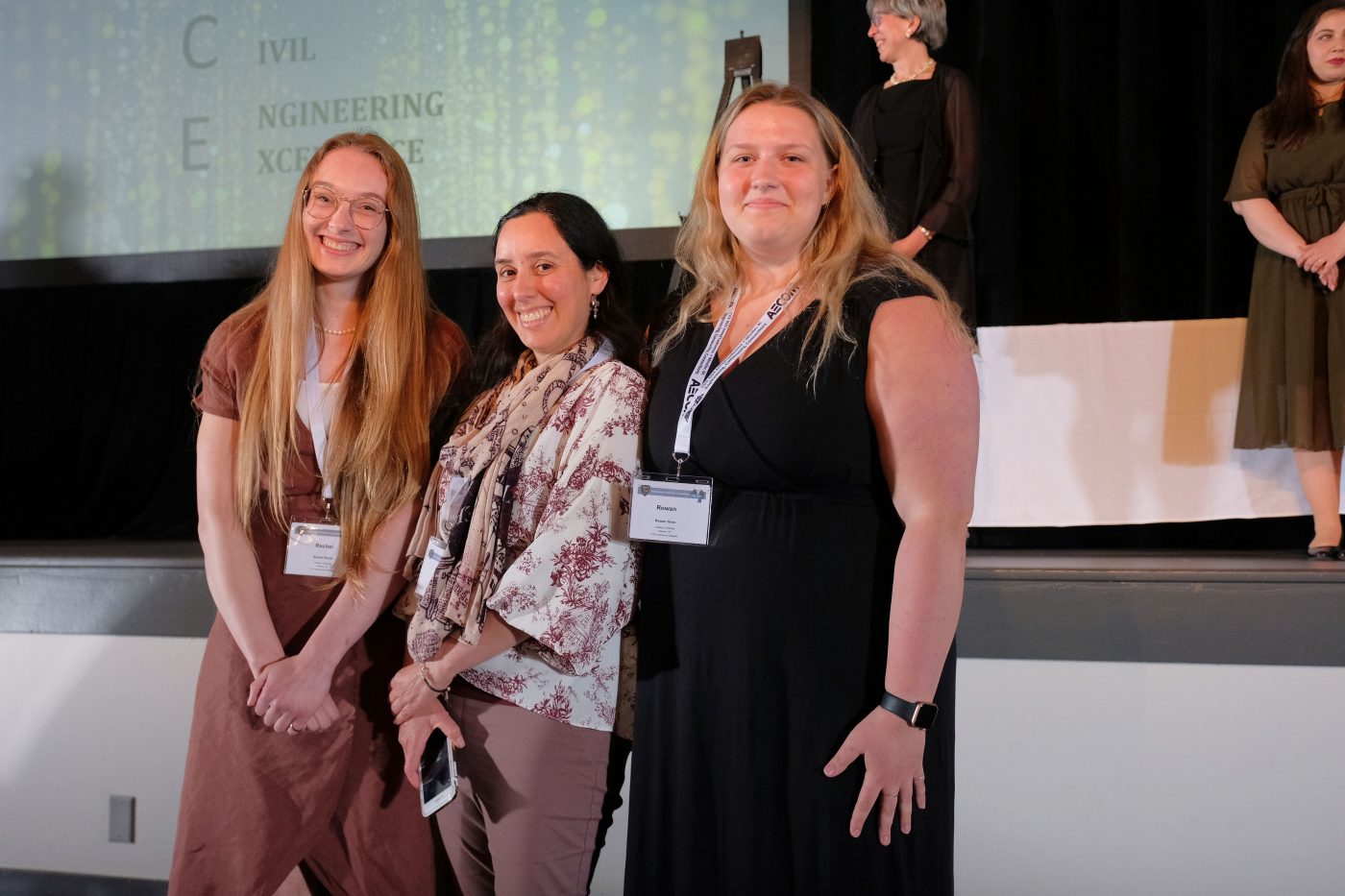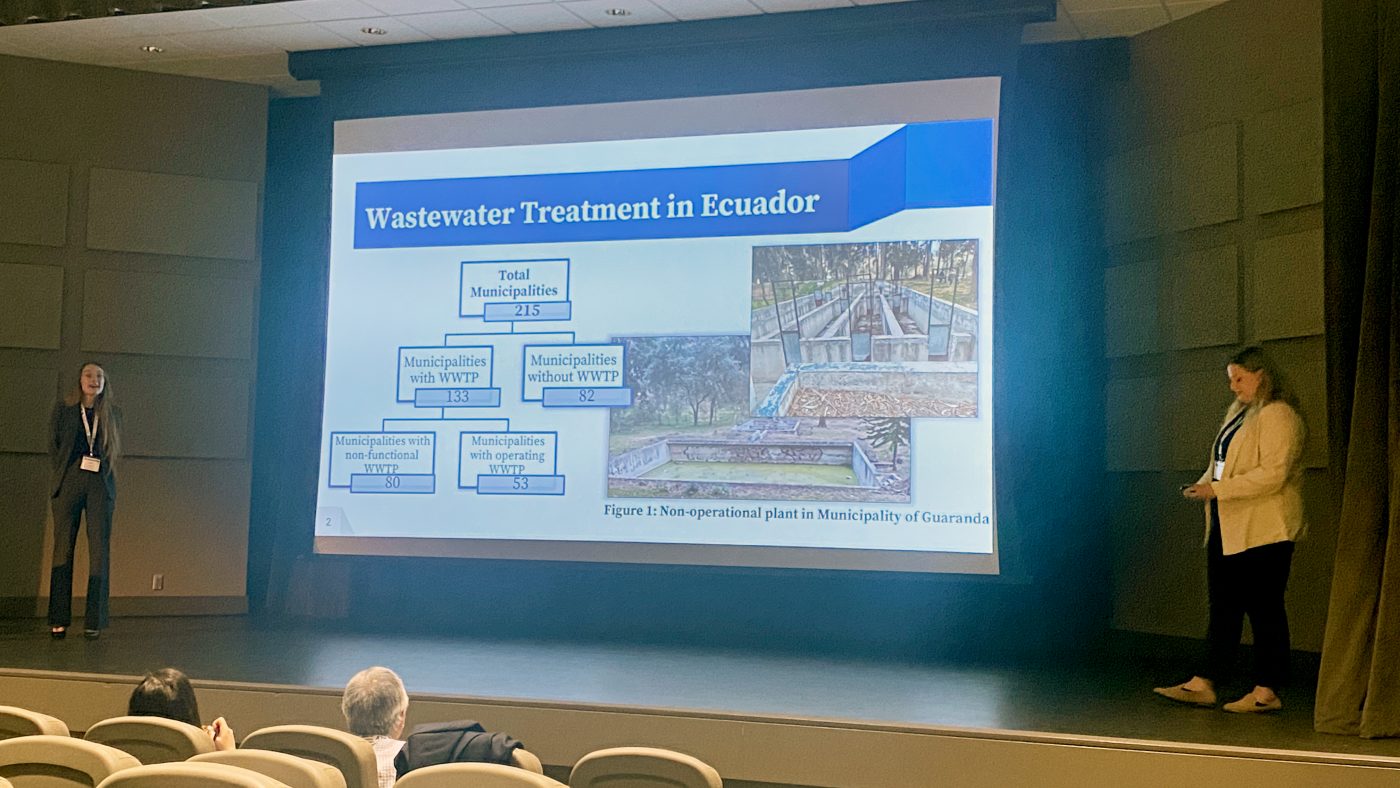Carleton Students Win Top Prize at Canadian Society for Civil Engineering Capstone Competition
A team of Carleton undergraduates recently won first place at the Canadian Society for Civil Engineering Capstone Competition for their project, “Wastewater treatment and Pilot Plant Design in Ecuador”.
In late May 2022, Environmental Engineering students Rachel Boyer and Rowan Ross attended the Canadian Society for Civil Engineering (CSCE) 2022 Annual Conference in Whistler, B.C. with their supervisor Prof. Onita Basu.
There, they showcased their project which was completed over eight months with fellow teammates James Greco, Rebecca Upward, Skylar Kraus, Alec Bell, Morgan Greenwell and Kaitlyn Shaw. The eight-person Capstone team had to completely reimagine an appropriate wastewater treatment plant for the municipality of Guaranda in Ecuador and with whom they cooperatively moved forward on a low-energy lagoon-style design.

Project liaison and Basu Research Group graduate student Andrea Ninabanda is from the area and, in discussing these wastewater treatment issues with Basu, the pair decided to take it on as a Capstone project for students back in 2020.
“It started with the prior years’ Capstone team conducting a capacity assessment of an abandoned wastewater treatment plant and then moved this year into an entirely new design,” says Basu.
Guaranda is just one of Ecuador’s many municipalities that require such a plant, as three quarters of these municipalities lack a functioning wastewater treatment facility. The final design included a bypass system, coarse screens, and aerobic and facultative ponds that fit the local landscape.
For all graduating engineering students, there is always the exciting possibility of going to a Capstone competition at a conference where they can rub elbows with their peers, gain knowledge from mentors and meet prospective clients from the industry. That excitement, however, was tempered by the impressive mix of so many other Capstone projects they’d have to beat to get there, says Ross.
Boyer and Ross spent the first days of the CSCE 2022 conference taking in presentations by PhD students, professors and industry professionals. Then on Friday morning, May 27, they and 20 other teams from engineering schools across Canada presented their projects. At that night’s gala, Carleton’s team was announced as first place winner of the competition.
“We were very humbled to be chosen from all of the civil engineering and architectural students from Carleton to go to CSCE,” says Boyer. “Then when we won it became overwhelming.”
“My first reaction was shock,” says Ross. “My eyes have never been wider. We still talk about how it hasn’t sunk in.”
The winning project was very responsive to its real-world design constraints and faced two big challenges: it required more data to make accurate engineering decisions and had to overcome a language barrier.
Luckily, they were able to use Carleton Capstone funding to conduct topography and water quality analysis tests on the ground, and they used English-to-Spanish text-to-speech translation for PowerPoints while depending on Ninabanda to watch over these presentations for glaring mistakes.

Ross said her biggest takeaway was just how different it was from designing in the classroom.
“For a similar classroom project, we were able to make some assumptions and there was so much data,” she says. “But here, there were regularly things that the client wanted us to change. We had to adapt and roll with the punches.”
Boyer, who was team lead, says her team worked very hard on the operational aspects like minimal maintenance and ease of monitoring.
“We designed our plant to be low in operation and maintenance costs,” she says. “We designed a simple, easy-to-operate plant so that if someone could come and perform maintenance only once a week, it would still be running all right.”
Ross will complete her Bachelor of Engineering in December before starting her career at a consulting firm. Boyer graduated from Carleton in April and plans to continue her studies at University of Victoria in a master’s program.
For the project to continue, it requires more investment and support at the local level says Basu. She is keeping in touch with municipal officials to see what can be done and she hopes it could be possible to take on a coordinated implementation project between the municipality, Carleton and another university in Ecuador.
“This project was particularly special,” says Basu. “While many engineering capstone projects have industry advisors, there are substantially less with an active client that is truly relying on the students to help solve an engineering challenge.”